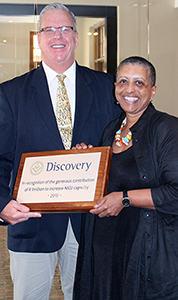Latest News Archive
Please select Category, Year, and then Month to display items
08 December 2021
|
Story Leonie Bolleurs
|
Photo Sonia Small
 The Office for International Affairs at the UFS recently hosted a delegation from the Namibia University of Science and Technology. Pictured here are, from the left, front: Seithati Ramonaheng, UFS International Scholarships in the Office for International Affairs (OIA); Dr Erling Kavita; Dr Erold Naomab; Prof Yonas Bahta; back: Kagiso Ngake, UFS Partnerships in the OIA; Cornelius Hagenmeier; Zenzele Mdletshe, UFS Partnerships in the OIA; and Dr Falko Buschke, Centre for Environmental Management.
The Office for International Affairs at the UFS recently hosted a delegation from the Namibia University of Science and Technology. Pictured here are, from the left, front: Seithati Ramonaheng, UFS International Scholarships in the Office for International Affairs (OIA); Dr Erling Kavita; Dr Erold Naomab; Prof Yonas Bahta; back: Kagiso Ngake, UFS Partnerships in the OIA; Cornelius Hagenmeier; Zenzele Mdletshe, UFS Partnerships in the OIA; and Dr Falko Buschke, Centre for Environmental Management.
The
Office for International Affairs (OIA) at the University of the Free State (UFS) recently (25 November 2021) hosted a delegation from the
Namibia University of Science and Technology (NUST).
During deliberations, the two institutions discussed the possibility of formalising a partnership and it was agreed that the OIA would lead this process through its Partnership portfolio. The UFS and NUST are looking to work together and share information on the development of a COVID-19 vaccination policy, leveraging on the Germany/Namibia green hydrogen partnership, joining forces on the application for centres of excellence administered by the African Union, establishing staff and student exchange programmes, and intensifying their research collaborations.
Cornelius Hagenmeier, the Director of the Office for International Affairs (OIA) at the UFS, chaired the meeting with
Dr Erold Naomab, the Vice-Chancellor of NUST, and his adviser, Dr Erling Kavita.
Prof Yonas Bahta, Associate Professor in the UFS
Department of Agricultural Economics, and
Dr Falko Buschke, Senior Lecturer in the UFS
Centre for Environmental Management, also attended the meeting and reported on their existing academic collaborations with NUST.
Neonatal Care Unit receives donation to expand capacity
2015-10-28
 With the best care and technology available,
the survival rate of premature
babies is about 85%. The neonatal intensive
care unit at the Universitas hospital can now
expand its capacity thanks to a donation of
R1 million by the Discovery fund.
From the left is Prof André Venter.
Head: Department of Paediatrics and
Child Health at the UFS, and mrs Ruth Lewin,
Head: Corporate Sustainability at Discovery.
|
The smallest people need the greatest care. This care is being provided by the neonatal unit in the Children’s Wing of the Universitas Hospital. This project of the University of the Free State (UFS), under the leadership of Prof Andre Venter, has led to several miracles regarding child health since its inception.
Now, thanks to a donation of R1 million rand from the Discovery fund, this unit can expand its capacity and treat more premature babies.
About 14% of babies in South Africa are born before the 37th week of pregnancy. These babies are born with a very low birth weight, and are in need of critical care. The neonatal intensive-care unit at Universitas Hospital is currently equipped to take care of about 14 premature babies at a time, from birth to discharge. However, because of the high incidence of premature births in the hospital’s service area, the unit needs about 45 beds.
The aim of the Children’s Wing Project is to expand the neonatal intensive-care unit in order to meet the demands of the hospital’s service area, which reaches as far as the Southern Cape. The Discovery Fund recently donated R1 million to the project, which will be used to expand the capacity of the neonatal intensive-care unit.
“With the best care and technology available, the survival rate of premature babies is about 85%. Without this, half of all premature babies would die,” says Prof Venter, Head: Department of Paediatrics and Child Health at the UFS.
“This is the reason why private and public partnerships, such as the one with Discovery, are essential to make specialised services available to the most vulnerable people. Discovery has made a significant contribution to the project without which we would not have been able to expand the capacity of the unit